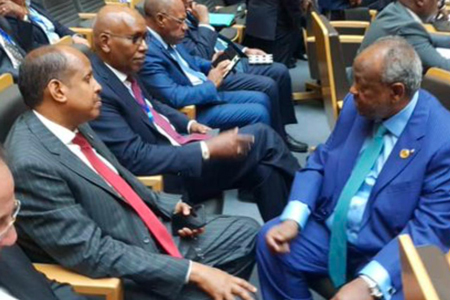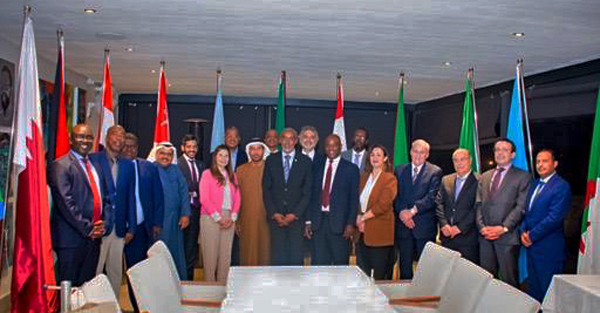15 February 2024 was a historic moment for both the East African Community and the African continent as a whole, for a number of reasons that are outlined in this article.
The African Union (AU) Summit in Addis Ababa brought together delegations from 49 African countries. Six members were absent due to the suspension of their membership of the organisation. The summit also welcomed several international guests, including representatives of the Arab League and the United Nations.
A range of political and security issues were on the agenda, with African leaders seeking solutions to pressing crises. Among the most pressing was the ongoing conflict in the Democratic Republic of Congo (DRC), which has claimed the lives of regional peacekeepers - including Southern African Development Community (SADC) forces - and displaced millions of Congolese citizens. Another critical issue that required the AU's immediate attention was the war in Sudan.
However, the 15th of February was particularly significant because on that day the continent's leaders elected a new Chairperson of the African Union Commission - the head of African diplomacy. The Chairperson represents Africa on the global stage and is responsible for managing the day-to-day affairs of the AU through collective action as outlined in the AU Charter.

Tough election fight
The election was, as expected, highly competitive, with three African cities - Antananarivo (Madagascar), Djibouti (Djibouti) and Nairobi (Kenya) - campaigning intensively, each rallying support for its candidate. The three candidates were:
- Richard Randriamandrato, former Foreign Minister of Madagascar
- Mohamoud Ali Youssouf, current Foreign Minister of Djibouti
- Raila Odinga, former Kenyan prime minister and veteran of opposition politics
After five rounds of voting, the winner was Mohamoud Ali Youssouf, who received 33 out of 49 votes. He defeated both Randriamandrat and Odinga to replace outgoing President Moussa Faki Mahamat of Chad.

Who is Mohamoud Ali Youssouf?
Mohamoud Ali Youssouf is a seasoned diplomat with a wealth of experience. He is fluent in Afar, Somali, English, French and Arabic and has served as Djibouti's Foreign Minister since 2005. His country, strategically located in the Horn of Africa, plays a key role for world powers. Djibouti is home to several major military bases, including the United Nations:
- United States Africa Command (AFRICOM) - the largest US military base in Africa.
- France's largest military base in Africa
- the only Chinese military base in Africa
Djibouti is also the seat of the Intergovernmental Authority on Development (IGAD), a major regional organisation comprising seven Horn of Africa countries and a major international diplomatic community.
Prior to becoming Foreign Minister, Youssouf served as Djibouti's Ambassador to Egypt and as Foreign Minister under three different Presidents. His career serves as an inspiration to young diplomats in the Horn of Africa and beyond. He is an active member of the Arab League and has chaired several key meetings, including a widely publicized meeting in September 2017.

Challenges facing the new AU leadership
The election of a Djiboutian foreign minister to head African diplomacy has been positively received in Africa and the Arab world. Both regions are looking forward to the strengthening of Afro-Arab cooperation - a South-South development initiative that could strengthen ties between African and Arab countries.
However, Youssouf faces significant challenges in taking up this new role.
1. African representation on the UN Security Council
- Africa has long advocated for at least two permanent seats on the UN Security Council with veto power - a reform that remains a top priority in international fora.
2. African Continental Free Trade Area (AfCFTA)
- The AfCFTA aims to promote economic growth across the continent. The African Union must work to accelerate its implementation and ensure that it delivers tangible benefits.
3. West African coups and AU sanctions
- Several West African countries experienced military coups during the tenure of former AU President Moussa Faki Mahamat, which led to their exclusion from the AU. Managing these political transitions and reintegrating these countries into the AU will be a major test.
4. Conflict in Sudan
- The war in Sudan is one of the most urgent crises on the continent. UN Secretary-General António Guterres has called for $6 billion in aid to help the 26 million Sudanese in dire need of humanitarian assistance.
5. Crisis in the Democratic Republic of Congo
- M23 militias have captured key towns in the east of the DRC, including Goma, a resource-rich area. The AU must help stabilise the region and broker peace.
A new era of African diplomacy?
Since his election, Youssouf has stressed his commitment to reforming the AU with qualified African diplomats and to working urgently to silence the continent's guns. With Africa's vast natural resources - including minerals, gas and oil - he wants to promote stability and development.

Author Ahmed Naji Bakal is Deputy Ambassador of the Arab League in Pretoria and former Chargé d'Affaires of the Arab League Mission in Pretoria. For comments, contact him at ahmedn.bakal@gmail.com
TDS/ gnews.cz - RoZ
Opening photos from the 38th African Union Summit PHOTO - GCIS/ Jairus Mmutle



